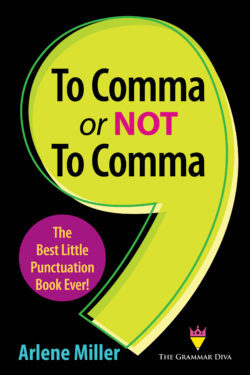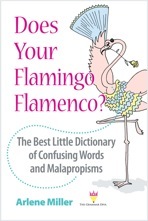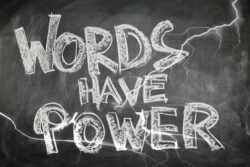Arlene Miller's Blog, page 29
June 18, 2020
10 More Often-Confused Words
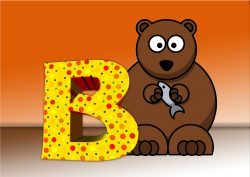 Image by Gerd Altmann from Pixabay
Image by Gerd Altmann from PixabayWhen someone says “on accident” instead of “by accident,” does it make you cringe? I first noticed “on accident” when my daughter said it years ago, and then I heard my 7th grade students and even younger teachers say it. It seems to be a generational grammar issue. Although the correct phrase is “on purpose, ” it is not “on accident.” It is “by accident.” Here are some more confused words and phrases:
1.bad/badly – Bad is an adjective, used to describe a noun: I have a bad feeling about that. Badly is an adverb that describes an action verb: I did badly on that quiz. The problem arises when you have a “being” or “linking” (or sensory) verb like feel, taste, or smell. Then you use the adjective, bad: I feel bad about how it turned out is correct. I feel badly is not correct, but is often used.
2. baited/bated – I waited with bated breath. Baited refers to a fish hook.
3. bazaar/bizarre – You can buy things at a bazaar. If you buy something really weird, it is bizarre.
4. because of/due to – Due to is used after the verb to be: His absence was due to having the flu (not because of having the flu). Because of means as a result of and is not used directly after the verb to be: She avoids strangers because of her extreme shyness.
5. beside/besides – Beside means next to: Come sit beside me. Besides means in addition to: There is no one here besides you and me.
6. biannual/biennial – Biannual is twice a year: The biannual catalog comes out every January and July. Biennial is once every two years: Every other year, we have our biennial talent show.
7. bimonthly/semimonthly – Bimonthly is generally every two months: The bimonthly calendar comes out six times a year. Semimonthly means twice a month: Our semimonthly newsletter comes out the second and fourth Mondays of every month.
8. born/borne – Born means brought forth by birth: I was born on July 6. Borne is the past participle of the verb to bear: She has borne six children.
9. bring/take – These two words go in opposite directions. You bring something back, and you take something away: Take these books back to the library. Bring home some new ones.
10. by accident/on accident – See above!
Here is the link to my upcoming talk on the Nonfiction Writers Association teleseminar on July 1.
June 12, 2020
It’s All About Me!
 Yup. This post is all about me in the stressful time of relocating, Covid-19, and buying a house. No wonder I am eating cheese popcorn and chocolate nonstop!
Yup. This post is all about me in the stressful time of relocating, Covid-19, and buying a house. No wonder I am eating cheese popcorn and chocolate nonstop!
I promise we will get back to grammarish things next week.
But first, how are you all doing in the pandemic, which isn’t over by any means, although there are those who choose to believe it is?
It is hard to believe that I have now been in Florida for 9 months! When I moved here last September, the world was”normal.” I could go to Target without a second thought. I could sit and drink a mocha at Starbucks. Remember those days? Remember when face masks were for Halloween and not a new fashion accessory?
Adjusting to Florida even in those normal days was difficult, and I am sure I am not done yet. I am out in the strip-mall-covered suburbs of Tampa with new developments everywhere (and I mean everywhere) you look. In California I was in more of a town. With an actual cute downtown. I was surprised to find out that the auto insurance in Florida is twice as much as it was in California, that there is terrible traffic (and drivers), and that there would be a Confederate flag proudly waving from someone’s private property along the highway about 10 miles north of me.
In November I returned to California to visit my son and my friends. In February, before the pandemic was recognized in this country, I returned to California for a short visit. Coronavirus was a new word back then. When a friend suggested I wear a mask on the plane, I scoffed at her. Yet I did go to Walgreens to look for masks. They were sold out. I was in three airports and four separate flights. I saw maybe five people with masks that whole time.
In Florida I have been living at my daughter and son-in-law’s brand new house. They had barely lived here since their jobs as professional ice skaters took them away touring for most of the year. This was to be their last year touring, and they would be home in early May when their tour was over. I was “babysitting” their house and thinking about where I wanted to move. I had planned to buy my own place (I had periods of wanting to rent too — and periods of wanting to go back to California) and move sometime this spring or summer.
Enter Covid. Of course the “kids'” tour was abruptly canceled in Mid March and they were home on March 16. I had gone to the library on March 14, and that was 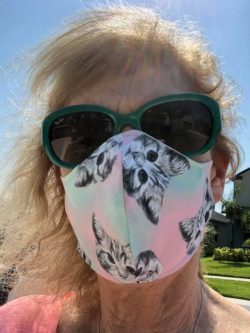 the last time I would go anywhere for a few months. They are working on finding employment, and I am buying a house.
the last time I would go anywhere for a few months. They are working on finding employment, and I am buying a house.
I left almost everything in California, so I need furniture. One cannot buy everything online. One might want to try out a sofa for comfort before buying one. So two days ago, the kids and I went to two furniture stores. After not going out to any retail establishments in months (the kids did the grocery shopping), I finally dared to go out. I sat down on sectionals, without sterilizing them. I went to the very crowded Ikea where more than half the people had no masks — and I didn’t notice any social distancing. I am still a little freaked out about that trip.
I bought a house that needed a little more than I thought it would, although it is lovely and in almost move-in condition. But signing all those documents, sending in financial information, paying for all those things like inspections without a second thought, arranging for things to be done right after I close and before I move in, buying enough furniture so I can live (and probably putting it together — thank you Shelley and Josh), getting insurance. I am stressed.
I am stressed because I am a naturally easily stressed person. I am stressed because the political situation in the United States has made many of us nervous wrecks for the past three and a half years. I am stressed because I miss my son and friends. I am stressed because I am in a new place and have had to stop doing things where I could meet people like my writing and publishing groups. I am stressed because I am afraid I will catch Covid. I am stressed because I am buying a house. I am stressed because I need to buy things and shopping is not fun as it used to be; it is downright scary!
Needless to say, I haven’t gotten a lot of writing done — except for my blog posts, of course. I am very committed to you all!
So that is what is new with me! Thank you if you have read this far! But I do have some grammar-related news!
I will be a guest on the Nonfiction Authors Association teleseminar series on July 1. It is free to attend. Click here for more information.
I am a proud finalist in the 2020 President’s Book Awards! The awards are sponsored by the Florida Authors and Publishers Association, and the book is:
June 5, 2020
The Quiz #1 – Ten Confusing Words
 Image by mohamed Hassan from Pixabay
Image by mohamed Hassan from PixabayHey! Hope you are all well.
Last week’s post was about ten often-confused words. This week’s post is a quiz on those words – with a few others thrown in. You will ace it! Scroll down at the end of the quiz for the answers and some word trivia.
QUIZ
1.The author made an (allusion, illusion, elusion) to Shakespeare in his short story.
2. I don’t think your grade on this one test will have an (affect, effect) on your getting into college.
3. (Almost, Most) everyone will be at the wedding.
4. She has one son, (age, aged) ten.
5. (Alright, All right, Allright), I will go with you.
6. Due to (adverse, averse) weather conditions, we shouldn’t go boating.
7. I never liked her (any way, anyway, anyways).
8. (Anyone, Any one) can do this simple puzzle.
9. (Anyone, Any one) of you could do this simple puzzle.
10. I (accidentally, accidently) messed up on two of the questions.
11. The (amount, number) of people here is unbelieveable!
12. Most people think that murder is (amoral, immoral).
13. The kids are (anxious, eager) to go to Disneyland.
14. We hope there will soon be an (anecdote, antidote) for the coronavirus.
15. Can I give you some (advice, advise)?
16. He acted (as if, like) he were in charge, but he wasn’t.
17. I don’ t take piano lessons (anymore, any more).
18. I will (assure, ensure, insure) that the dog doesn’t hurt the children.
19. Can you stay (a while, ,while)?
20. Is there (anyway, any way) you can stay longer?
Word trivia:
The word — and the suffix — phobia mean fear or fear of. Can you guess what these phobias mean?
Anuptaphobia
Autophobia
Anthrophobia
Aeroacrophobia
Ambulophobia
Scroll down for the answers:
ANSWERS
(See last week’s post for explanations of the words. For words not in last week’s post, explanations are in parentheses.)
1.The author made an (allusion, illusion, elusion) to Shakespeare in his short story. (Illusion is something that isn’t there. Elusion is not a word.)
2. I don’t think your grade on this one test will have an (affect, effect) on your getting into college.
3. (Almost, Most) everyone will be at the wedding.
4. She has one son, (age, aged) ten.
5. (Alright, All right, Allright), I will go with you.
6. Due to (adverse, averse) weather conditions, we shouldn’t go boating. (Averse means in opposition to; adverse means unfavorable.)
7. I never liked her (any way, anyway, anyways).
8. (Anyone, Any one) can do this simple puzzle.
9. (Anyone, Any one) of you could do this simple puzzle.
10. I (accidentally, accidently) messed up on two of the questions.
11. The (amount, number) of people here is unbelievable!
12. Most people think that murder is (amoral, immoral).
13. The kids are (anxious, eager) to go to Disneyland.
14. We hope there will soon be an (anecdote, antidote) for the coronavirus. (Anecdote is a short, humorous story.)
15. Can I give you some (advice, advise)? (Advise is the verb – to advise someone.)
16. He acted (as if, like) he were in charge, but he wasn’t. (As if is used when a clause, which contains a verb, follows. Like is used for a simple comparison: He acted like the boss.)
17. I don’ t take piano lessons (anymore, any more).
18. I will (assure, ensure, insure) that the dog doesn’t hurt the children. (Insure involves money, assure is to promise, and ensure is to make sure.)
19. Can you stay (a while, awhile)? (Awhile can be replaced by “for a while.”)
20. Is there (anyway, any way) you can stay longer?
Word trivia:
Anuptaphobia – Fear of staying single.
Autophobia – Fear of being alone or of oneself.
Anthrophobia – Fear of flowers
Aeroacrophobia – Fear of open high places
Ambulophobia – Fear of walking
Stay Well and Stay Safe!
And, by the way – All these words and many, many more are explained in my book, Does Your Flamingo Flamenco?
May 29, 2020
10 Often-Confused Words
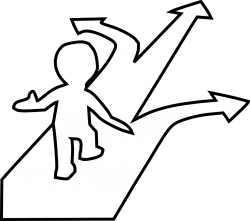 Image by Clker-Free-Vector-Images from Pixabay
Image by Clker-Free-Vector-Images from PixabayA few years ago, I wrote a book about confusing word pairs/groups. And I have done some blog posts about them in the past. This post begins a series of posts (probably not every week) about the most commonly confused words.
1 Oh, what would this list be without affect and effect! Most of the time, affect is a verb and effect is a noun.
This rainy weather certainly affects my mood! (verb – action word)
What effect does the rainy weather have on your mood? (noun – thing)
But of course nothing is quite that simple. A small percentage of the time, they switch part of speech: affect (pronounced with an a like in cat and the emphasis on the first syllable) is a noun and effect is a verb.
He is nice, but he has a strange affect. (way of being or presenting herself)
The new mayor said she will effect great change in the city.
2. Age and aged. Age is a present tense verb or a noun. Aged is a past tense verb or an adjective.
He is the same age as I am. If you don’t take care of yourself, you may age poorly.
My brother, aged 9, is in fourth grade. These apartments are for an aged population. This cheese has aged well.
3. Almost and most. The general rule is that if you can use almost, use it. If almost doesn’t make sense, use most.
Almost everyone is going to the wedding. (not Most everyone)
Most of the people are attending. (correct, because Almost of the people doesn’t make sense.)
4. Alright and all right. Already is a word. Altogether is a word. But alright is a slangy word.
All right as two words is always correct, no matter what the usage is.
Are you all right? All right, I will go.
5. Amoral and immoral. If you are amoral, you don’t really have a moral code. If you are immoral, you have no morals.
It is immoral to steal. The murderer seemed amoral and did not know the difference between right and wrong.
6. Amount and number. Like our old friends less and fewer, one is used for singulars and things that cannot be counted (amount), and the other is used for plurals and things that can be counted (number).
The number of accidents on this corner has decreased during the past few months. (Note the singular verb.)
The amount of crime in this neighborhood has increased lately.
7. Anxious and eager. Anxious is often used when you mean eager.
I am eager to travel to Italy next year. (not I am anxious to travel, unless you are worried about it.)
I am anxious about the math test.
8. Any more and anymore. Both are correct but used differently.
I don’t work there anymore. (any longer). Would you like any more cake? (additional)
9. Any one and anyone. Both are correct, but used differently.
Is anyone here? Anyone can fix this (refers to some person.)
Any one of these suits will do. (doesn’t necessarily refer to a person — although it can refer to people — and usually followed by of)
10. Anyway, anyways, any way. First, we can just eliminate anyways because we say anyway.
Take this cake because I don’t like chocolate anyway. ( meaning the same as anyhow)
Is there any way you can come into work tomorrow? You can drive there any way you want. (in any manner)
Be safe and be well!
May 21, 2020
Yikes!!!!!!! That Exclamation Point!
 Image by Alexas_Fotos from Pixabay
Image by Alexas_Fotos from PixabayThe often overused exclamation point (!) indicates strong feelings or shouting, or shows emphasis. It is sometimes used at the end of a sentence. Other times it follows an interjection (word or phrase of exclamation).
Watch out for the falling rocks! (sentence)
Yikes! Oh, no! (interjections)
Watch out! (sentence)
The exclamation point, otherwise known as the exclamation mark, is often used alone to draw attention to a warning of danger or hazards. You have probably seen a yellow triangular sign with a black exclamation point on it.
Sometimes exclamation points are used at the end of a question instead of a question mark — if the sentence is exclamatory as well as a question:
How could I have forgotten to pack underwear!
Didn’t you see the car coming straight at you!
Here are some facts (or maybe facts) about exclamation marks:
Several computer languages use “!” at the beginning of an expression to indicate negation: “!” A = not A
Some languages use “!” to denote a click consonant.
One theory of the mark’s origin is that it is derived from a Latin exclamation of joy (io).
The modern written mark is believed to have been born in the Middle Ages when copyists wrote the Latin word io at the end of a sentence to indicate joy. The word io meant “yay.” Over time, the i moved above the o, and the o became smaller, becoming a point.
The exclamation mark was first introduced into English printing in the 15th century and was called the “sign of admiration or exclamation.”
There was no key on the standard manual typewriter that could make an exclamation point before the 1970s. You would have to type a period, backspace, and then type an apostrophe.
In the 1950s, secretarial manuals in America referred to the mark as a “bang,” a precursor to the interrobang, which is a mark combining a question mark and an exclamation mark — not generally used or on keyboards.
Thus, the exclamation mark and question mark are sometimes used together ?! It is recommended we avoid this in formal writing or any kind!
Overly frequent use of the exclamation mark is generally considered poor writing; it should be used very sparingly.
The exclamation point is often used in comic books.
Studies suggest that women use exclamation points more than men do. (Perhaps women write more. Or perhaps it has something to do with the fact that women use little circles for the dots on their i’s more than men do too!)
One study thought that exclamation points might be friendlier than periods in some cases, such as Hi! rather than Hi, or Hi.
An exclamation point within parentheses (!) can imply that the writer has made a sarcastic comment: “Oh, I thought you were waiting for a formal invitation to visit (!)”
F. Scott Fitzgerald said that using exclamation marks is like laughing at your own jokes.
One exclamation point is enough to indicate surprise or emotion of some kind. However, digital communication has led to the use of multiple exclamation points in a row, as well as overuse of the mark in general. A linguist conducted a Twitter poll asking how many exclamation points were necessary to indicate genuine enthusiasm. After 800 votes, the winner was three.
A journalism school told its students that they each had one exclamation point to use for their entire career, so use it wisely. A writer friend told me not to use more than two in a novel. The writer Elmore Leonard said, “You are allowed no more than two or three per 100,000 words of prose.”
More to Know About Exclamation Points

Some brand names and places have exclamation points included:
Yahoo! and Joomla!
Jeopardy! and the old TV show Shindig!
The musicals Oklahoma!, Oliver! and Oh! Calcutta!
Movies Airplane! and Moulin Rouge!
The English town of Westward Ho! and a town in Quebec called Saint-Louis-du-Ha! Ha!, which is spelled with two exclamation marks.
Other Punctuation with Exclamation Points
Put the exclamation point inside the quotation marks if it applies to the words enclosed by the quotation marks: “I smell smoke!” he yelled.
Put the exclamation point outside the quotation marks if it applies to the entire sentence: I hot-footed it out of the building when he said, “I think I smell smoke”! (In this example, you could assume that both what he said and the whole sentence were exclamatory, in which case the exclamation point would go to its default position of inside the quotation marks.
Lesson: Don’t overuse your exclamation points in formal writing — or even in informal writing — or even in e-mails unless they are very friendly. Same with texts.
Thank you to these websites:
Stay safe and be well
May 14, 2020
Fun with Misplaced Modifiers
 Image by GraphicMama-team from Pixabay
Image by GraphicMama-team from PixabayIn the English language, words are generally understood to go with the words that are near them. Putting words in other places in a sentence often makes the sentence unclear — or even silly. The problem is generally with misplaced or dangling modifiers. These modifiers are generally prepositional phrases or participial phrases. Misplaced phrases are simply near the wrong word in the sentence. In dangling phrases the word they modify isn’t in the sentence at all. Misplaced modifiers are often hard to catch and are a common writing problem.
Here is my favorite dangler:
While still in diapers my mother remarried.
Since while still in diapers is next to my mother, the sentence actually means my mother was still in diapers. While still in diapers refers to me, which isn’t even in the sentence and needs to be added: While I was still in diapers, my mother remarried.
Here is another dangler, missing “I”:
Reading a book by the window, my cat jumped onto my lap.
This would be silly unless cats have recently learned to read. While I was reading a book by the window, the car jumped onto my lap.
The two examples above contain dangling participles. Here is a misplaced one:
She read from her new book wearing glasses.
Although we pretty much assume it is the author who is wearing the glasses, the sentence says that the book is wearing glasses because the words are placed next to one another.
Here is a misplaced prepositional phrase:
You might like this mixing bowl set designed to please an expert cook with a round bottom for efficient beating.
Who or what has the round bottom? The cook? You might like this mixing bowl set with a round bottom for efficient beating, designed to please an expert cook.
Here are more fun ones:
You are welcome to visit the cemetery where famous Russian composers, artists, and writers are buried daily except Thursday.
(Daily except Thursday, you are welcome to visit the cemetery where famous Russian composers, artists, and writers are buried.)
I must ask you to banish all information about the case from your mind, if you have any.
(I must ask you to banish from your mind all information about the case, if you have any.)
Many of the members congratulated him for his speech at the end of the meeting and promised him their vote.
Here, we cannot tell if the members congratulated him at the end of the meeting, or if his speech was at the end of the meeting. (Many of the members congratulated him for his speech and promised him their vote after the meeting was over.)
You might be interested in this antique desk suitable for a lady with thick legs and large drawers.
(You might be interested in this antique desk with thick legs and large drawers, suitable for a lady.)
I am selling several old dresses from grandmother in beautiful condition.
Who is in beautiful condition? (I am selling several old dresses in beautiful condition that belonged to my grandmother.)
The farmer wanted to hire someone to take care of his horse who doesn’t’ smoke or drink.
(The farmer wanted to hire someone who doesn’t smoke or drink to take care of his horse.)
Teaser:
We almost made a profit of $10.
How much did you make? Answer at the end of this post.
While we are having fun with words, here are some questions for you:
Is there another word for synonym?
If a parsley farmer is sued, can they garnish his wages?
Does the little mermaid wear an algebra?
How is it possible to have a civil war? (good oxymoron)
If you try to fail, but you succeed, what have you done?
Remember that there are many ways to rewrite a sentence. So in the rewritten sentences above, there are other options, including making a sentence into two sentences.
Answer to teaser:
You may not have made anything at all.
We almost made a profit of $10. You almost made a profit. You didn’t make anything.
We made a profit of almost $10. You may have made $9 or $9.99….whatever profit you made, it was almost $10.
Stay safe and stay well.
May 7, 2020
Those Pesky Pronouns: Best of the Grammar Diva
This blog post was originally published on September 27, 2013. I am in a writing conference (virtual) this week, so I am running a Best of the Grammar Diva post. Enjoy!
Pronouns are one of the eight parts of speech. They are used to stand in for a noun (or another pronoun), and they probably cause more trouble than any other part of speech. There are six varieties of pronouns.
1. Personal Pronouns:
I me my/mine
you you your/yours
he him his
she her hers/her
we us our/ours
they them their/theirs
it it its
who whom whose
The pronouns in the first column are used for subjects in a sentence (nominative case). The ones in the second column are objects (objective case). Those in the last column are possessive (possessive case).
If you took Latin, you might remember these as nominative, accusative, and genitive (I think!)
A. She and I went to the movies.
She and I went to the movies with him and her. (If you have a problem deciding, just take out the other person, and see which sounds right by itself.)
B. It’s between you and me (Not you and I….these pronouns are the objects of the preposition between. You wouldn’t say between we, would you??)
C. Trouble with who and whom? Try substituting he and him. If he works, use who. If him works, use whom.
Who is going with you? (He is going with you.)
Whom are you inviting to the party? (I am inviting him to the party.)
With whom are you going? (I am going with him.)
D. Remember that none of the possessive pronouns (right-hand column) have apostrophes, so its doesn’t either when it implies ownership.
2. Demonstrative Pronouns:
This, that, these, and those — and they don’t usually cause problems. Just remember to use this and that with singulars, and these and those with plurals (not these kind of books, but these kinds of books).
3. Interrogative Pronouns:
Used to ask a question: Who, whom, whose, what, and which – These generally don’t cause a problem.
4. Reflexive/Intensive pronouns:
These are the pronouns with -self at the end: myself, yourself, himself, herself, itself, ourselves, yourselves, themselves
Remember: The only time you can correctly use myself in a sentence is when I is the subject. Likewise, you can use yourself only when you is the subject, and so on.
Correct: I made myself a fancy dinner.
Incorrect: She told a story to him and myself. (should be me)
5. Indefinite Pronouns:
There are many of these including the ones ending in -thing, -one, and -body: Nothing, something, anybody, everything, anyone, etc.
Those are all singular, which leads to a problem! (There are several indefinite pronouns that are plural.)
Everyone is bringing their tents. (Everyone is singular and so is the verb is. But their, which stands in for everyone, is plural. This “mistake” is frequently made because there is no singular pronoun for a human that isn’t gender specific. “Him or her” is awkward to say. Therefore, it has actually become acceptable to use the singular their. I don’t like it and would recommend just rewriting the sentence to avoid the problem:
Technically incorrect (but acceptable) – Everyone is bringing their tents.
Correct, but awkward – Everyone is bringing his or her tent.
Rewritten to solve the issue – Everyone is bringing a tent.
6. Relative Pronouns:
These pronouns introduce clauses: which, that, who, whom, and whose.
Examples:
This is the boy who lives next door.
That movie, which I saw last year, is now out on DVD.
Just remember to use which and that for things; and who, whose, and whom for people. Also, use commas around the clause if you could take it out and preserve the meaning of the sentence. Use no commas around the clause if you need it to understand the sentence or identify whom or what you are talking about.
For more information on pronouns, you might want to buy my books. 
April 30, 2020
New World, New Vocabulary
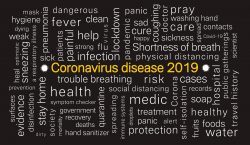 Image by Fathromi Ramdlon from Pixabay
Image by Fathromi Ramdlon from PixabayWill things ever be the same again? TV shows are broadcasting from cast’s homes. Some are relying on Patreon to make a living. We are homeschooling. The unemployment rate is sky high. Many of us are at home. We have a mask wardrobe. And we have new vocabulary. Much of this vocabulary applies to more than Covid-19, but for the sake of this post, we will refer to everything in terms of Covid-19.
Here are a few new acronyms and abbreviations we were not familiar with a few months ago:
Covid-19 = Coronavirus that was first seen in 2019.
SIP = Shelter in place (staying home)
PPE = Personal protection equipment (masks and gowns for medical personnel)
And lots of new words:
Novel virus – A virus that has not been seen before. Although there have been many other types of coronavirus before, not this one, Covid-19.
Epidemic versus Pandemic – An epidemic is the occurrence of a disease that spreads among many people in a location where it is not permanently present. A pandemic is a disease that has spread to an entire country or continents.
Quarantine versus self-quarantine versus isolation versus self-isolation – People are put into quarantine when they are not sick, but have been (or may have been) exposed to a disease, to help stop the spread. Self-quarantine is when someone isn’t ordered to go into quarantine but does so out of caution. A person who is infected with a disease and is infectious is isolated from healthy people to stop the spread. People who say they are self-isolating may or may not be infected with the disease.
Asymptomatic – Without symptoms. Apparently some people who have Covid-19 may have no symptoms, but may be spreading the disease unknowingly. Good if you get it and have no symptoms, but bad since you are spreading it unknowingly.
Community Spread – People in a certain area becoming infected from others, whether they know who infected them or not.
Flattening the Curve – The idea of slowing the spread of a disease like Covid-19 so that hospitals can accommodate the patient flow. There may not be fewer cases in total, but there are the same number of cases over a longer period of time.
Herd Immunity – The opposite notion of flattening the curve, where you send everyone out to catch the disease until we become immune. Sweden has been trying this, and it didn’t work well for them.
Mask – Not just for Halloween anymore. The making of masks has become a big thing for those who sew. Some are making them for medical personnel (thank you. Some are making fanciful printed masks and selling them. Some are improvising their own masks with bandanas, thongs, and scarves.
Test– No grades given on these, just positive or negative. We hear “Test, test, test, ” and “Where are the tests?” There has been lots of talk about the Covid-19 tests, which finally seem to be more available, even to those without symptoms.
Antibody – You develop these if you have had Covid-19 already, with or without symptoms, and you might therefore be immune or somewhat immune to getting it again. The antibody tests are blood tests (unlike the cheek and nasal swab tests to see if you have the disease) and are starting to appear. However, we don’t know their accuracy and, more importantly, we don’t know if people are immune to getting it again or not.
Contact tracing – Finding those people whom infected people may have come in contact with and therefore exposed to Covid -19. For example, if someone who flew on a certain flight proved positive for Covid-19, the other passengers would be notified.
Ventilator – Machine that helps people breathe….and there weren’t enough of them. Or they were in the wrong places. Or broken. But we heard a lot about them.
Unemployment – Lots of that around, and you know what it is.
Front-line workers – Nurses, doctors, EMTs, other medical personnel, firefighters, and others who respond in a health crisis.
Essential workers – Those who still work during a pandemic because they are needed, including of course the front-line workers – also police, bankers, sanitation workers, etc.
Social distancing – Keeping space between you and everyone else when you leave home, so you don’t catch Covid-19 – in this case 6 feet.
Cuomo-sexual – Those who highly approve of Governor Cuomo’s handing of the Covid-19 situation in New York.
Zoom – How we have meetings, learning experiences, and get togethers during the pandemic.
SNL at Home – A great try at making do with what you have…and somewhat a success!
Stay at Home – The new mantra
I am sure I have missed some of our “new vocabulary,” so let me know in the comments.
Stay well and stay home if you can.
April 24, 2020
Whatcha Doin’ At Home?
 Image by Annalise Batista from Pixabay
Image by Annalise Batista from PixabayI recently ran a couple of posts on your pandemic stories. Last week I asked what you are doing now that you are home most of the time. I got some great replies, so here they are. The first one is more of a pandemic story and definitely worth a read. I did leave in a couple of compliments I got because they make me happy and very grateful. I hope these stories will do the same for you… And I did add what I am doing too!
Grateful from Across the World
Dear Arlene,
I love your grammar lessons and I have been reading the wonderful
stories from people all over the world, managing in these times. Feel
free to delete anything that is not suitable as per the situation.
Here is my story:
I have always wanted to attend a masquerade ball. I have seen them in
the movies, and always found it fascinating how people are not
recognized by the other characters in the movies, but we know who they
are. Of course, in my lifetime, I never got the opportunity to attend
any of those kinds of parties.
Little did I know that our lives would turn around and every day would
become a masquerade ball, where we have to hide behind masks, thanks
to Covid-19. It is not easy to recognize people with their masks on,
trust me.
It is interesting to see, though, how we are avoiding people in the
elevator, on the streets, on stairs, in hallways, in the aisles of the
supermarkets, or anywhere else. The virus has us fearing contact with
people, and we panic when we see someone coming our way. Social
distancing has become a terminology we use so freely. I also know,
that when all this is over (which it will be), we will use this sacred
terminology in a sarcastic, mocking, or humorous way. I hope we will
not forget what all we have been through together as a world.
Until last year, I was teaching in China, and it was the hardest thing –
trying to protect myself from not getting banged into, pushed,
shoved, or coughed or sneezed at. I always wondered how
they did not know basic courtesy. Don’t get me wrong. Those were the
best days of my life, there in China. I am not judging their
culture. And since the onset of Covid-19, they have had to learn their lessons
the hard way.
However, I do not want to dive into comparing people and cultures. I
want to share what I have learnt from the days in quarantine. After
all, we must concentrate on the positive and take every day as a
lesson. I am enjoying the experience of teaching from home, I have a
hot lunch every day, do Zumba in my living room every afternoon, and
every evening sit for meditation. I am concentrating on my well-being.
Teaching online was quite challenging in the beginning. But the most
amazing part has been how online teaching websites and resources have
opened up their hearts and websites to share free resources online. It
has been a blessing in disguise. My students did take their books home,
yet teaching online is not the same as teaching in the classroom.
This generation, which I call an IT generation, needs more stimulus to
stay engaged. And these online resources are just perfect to keep
them engaged – not to mention the ease of correction. I just need to
link my classrooms to that website; and my students receive the lessons
in their Google classroom, complete the tasks, and submit. The work gets
either corrected or I get to see where the students need extra help.
What more could I ask for?
I would like to shout out a huge “Thank You, to all those “owners”
of those websites for opening up their hearts and sites and giving
teachers like me a world of resources to work with. My students are
learning, benefiting, and enjoying the teaching and learning process.
This is pure and selfless service to all students, parents, and teachers.
Bless you all. Stay safe, happy, and calm,
Kawita Thani, Secondary English Teacher in Jakarta, Indonesia
*******************************************
Quiet Times
Hi Arlene,
I think you asked how people have been spending their time at home. Here
are a few of the things I’ve been up to:
1) Making sourdough bread (like 95 percent of the world, it seems).
2) Going through boxes of memorabilia accumulated from my (now-adult)
kids’ years in school. No, we don’t need the second-grade spelling
worksheet. I am snapping pics of things I really want to remember.
3) Attending Zoom meetings and webinars on meditation, writing, writing
and meditation, meditation and writing. And more meditation.
4) Checking graphs for signs of a downward-bending curve and studying
world maps. Appreciating Johns Hopkins for their relentless data
reporting, but feeling the immense suffering indicated by the
ever-expanding red circles.
5) Walking. And walking, and walking, and walking more. Alone, now
masked, and often on the phone with a friend who is also walking, to
simulate walking together.
6) Writing and editing. Well, mostly editing, since I have found it hard
to write anything that is not related to Covid-19.
7) Reading blogs/newsletters during the day and novels (as usual) in the
evening.
8) Watching Netflix and Amazon Prime (like 95 percent of the world).
Looking forward to getting back to grammar!
Stay well,
Audrey Kalman, author, California
*****************************
So Much Ambition!
Hi Arlene,
I am very busy. I have done a complete spring cleaning of my house from ceiling to floors and everything in between. Last week, I began a project to repaint my kitchen cabinets. This should take me three weeks to complete. Yesterday, I made 18 cloth masks for family. Today I am resting. Back to the cabinets tomorrow. Walk a mile every day, weather permitting
If this goes longer than May 4th, I may start my fall cleaning! LOL!
Elaine Pantano, Massachusetts
************************************
One, Two, Three Priorities
Early on in the sheltering at home, I decided that I would do three things every day. 1) Walk or do tai chi 2) Practice trombone if only for ten minutes, and 3) Do the dishes. Everything else was negotiable. I don’t know why I did this. I used to only walk or do tai chi once or twice a week. I do know that it has been important. I sure haven’t FELT like doing the dishes. Without a decree, the plates and bowls probably would have stacked up like a Dr. Seuss illustration. The two days that I didn’t feel well and didn’t get my practicing and walks in, I felt myself slipping into a nebulous place with no schedule and no emotions. That’s okay for a short time, but I got back to my three things as soon as I could. I plan to keep them for the duration. When this is all over I’m going to have quads of steel.
Rae Rae Millard, Musician, Writer, California
*********************************************
Making Good Use of Time
Here is a list of things I’m doing while sheltering in place:
Yoga
Meditation
Final editing of my 3rd book
Exercising on my stepper
Uploading 10 minute meditations for my students
Reading
FaceTiming with my kids, siblings, and grandkids
Playing Scrabble with my husband
Aliza Herbst
*************************************
Intellectual Undertakings
Not much of a change since my retirement in 2008. Instead of going shopping with my wife, I stay in the car (should have started that earlier…), and when she comes back I return the cart and disinfect it for the next customer – though some shopkeepers have a staff-member do that chore.
What we miss most, now that the weather is looking up, is going for a cappuccino on the “pavement terrace” of our favourite café, restaurants, and, of course, dining out with family and friends.
Personally, I had to go without attending the annual performance of Bach’s Saint Matthew’s Passion for the first time in 29 consecutive years (you may know that this is quite a popular thing in the Netherlands), but since I had already ordered tickets for the 2021 performance, these 2020 tickets will come in handy in 2022, I hope . . .
So I have to make do with my laptop, tablet, and smartphone: watching Netflix on my tablet; reading Baldacci, Coben, Crais, Child, Lehane, Pelecanos, and many, many more on my tablet; doing some NLP-programming (No! Not Neurolinguistic nonsense, but genuine Natural Language Processing!) and logic programming, especially solving constraint logic problems (think of the Zebra-puzzle); and cheating on the weekly Sudoku challenges in Saturday’s newspaper, naturally.
So not much excitement during our “intelligent lock-down” as proudly presented by our Prime Minister, which may probably continue until the beginning of June, at least.
Stay well, all of you!
Will Snellen, Netherlands
***********************
Keeping Busy
First: re “Forget Him”: [comment on last week’s blog post]
” He can’t give you love that isn’t there” is how I originally learned the song, transcribing the words from a TV performance of it, so I guess some older but equally wise grammar diva must have come down on him like a ton of bricks?
Second, we’re zooming two to three meetings a day, then nicking away at the humongous list of things we always said we’d rearrange, fix, or prune, if we ever had the time. Sadly, that’s no longer an empty threat.
Third, I’m working on my book, finishing about a chapter a week.
Last, I’ve discovered that the pro-nutrition people lied. A high-fiber, low-sugar, healthy diet has not made me thin.
Hope all is well with you. You were one of our most popular speakers.
Knuti VanHoven, Fremont (CA) Area Writers
**********************************
Not Much!
Every day at about 5 p.m. I ask the same question: Where did the day go?
I moved from California to Florida last September to my daughter and son-in-law’s house. They were on tour, so I was here alone. I was planning to buy my own place here this spring or summer. Then Covid-19. They were due back in May, but they job got canceled in mid March, so here we are. I am very routine oriented so I do similar things every day. I get up early-ish to read and watch news. I watch entirely too much news, but I am cutting down a little. I take care of e-mail and social media things in the morning. I haven’t been able to write much — except for this blog post, which gets done every Friday! Other than that, I walk the dog to the mailbox every day; exercise 30 or so minutes seven days a week; do a little writing, marketing, and research; watch a little Netflix with my kids; look at real estate online; eat carbs; do laundry and a little cleaning; read; and listen to political podcasts. Oh, and Zoom with friends, attend webinars, text, and phone my son and friends in California. I don’t bake bread or cook (but my son-in-law does), I don’t garden, I don’t meditate (although I try), and I don’t walk outdoors much. Too hot and humid by the time I get around to it. I find I am exhausted and have very little ambition. I don’t sleep well and fall asleep listening to podcasts. I think of all the things I could be doing….and keep rewriting my To Do lists.
Arlene, The Grammar Diva
April 16, 2020
Oy! The Things I Hear on TV!
 Image by muhammad rizky klinsman from Pixabay
Image by muhammad rizky klinsman from PixabayI must admit I have been a news junkie for the past several years. And during the past few weeks, my addiction has continued — until the last few days, when I decided I just couldn’t take it anymore. And it wasn’t just because of the bad grammar! However, in the past several weeks, there have been an unusually large number of guests (doctors and others) on cable news. I don’t expect everyone to have perfect grammar. But it does make me sad when doctors and other highly educated people make grammar faux pas. Here are some things I have heard recently.
The most frequent error I have heard is the fewer/less conundrum: saying less when fewer is correct. “less people, less cases, less tests…” and on and on.
I saw photo’s as a plural somewhere — must have been on a news chyron (I just learned how to spell chyron – the words at the bottom of the news screen).
I heard between used with I : between him and I . I hear that a lot, as I am sure you do and it makes me crazy!Argh!!!!!!!
I heard a doctor start a sentence with “Me and . . ..”
I heard a Los Angeles physician make two mistakes in one short interview that frankly appalled me, but that’s me: 1) less patients rather than fewer 2) have came to the emergency room (that is the one that really got me.)
Another medical person: “If I could have sang . . .”
Secretary of State Pompeo made a common mistake: We have arranged it where they don’t have to worry about getting home (no): We have arranged it so that they don’t have to worry about getting home (yes).
I know that there is a very serious pandemic, and the grammar we hear on the news is the least of our problems. But this is a grammar blog, and I know I am not the only one driven crazy by these mistakes made over and over again. After all, isn’t it as easy to speak correctly as to speak incorrectly??
Speaking of songs — which we weren’t, but I was listening to oldies and cringed when I heard this one. You have to be pretty old to remember this song, and the error isn’t really a big one (in fact, I don’t even think it’s “wrong,” but it sounds really wrong to me):
1963, Bobby Rydell in the song “Forget Him”: He can’t give you love which isn’t there. (How about He can’t give you love that isn’t there?)
On the other hand, kudos to Tim Hardin, the songwriter who wrote “If I Were A Carpenter,” correctly using the subjunctive mood.
So…what are you doing while you shelter at home? Taking up a new hobby? Learning a new language? Taking online classes? Writing? Playing an instrument? Coloring? Watching a lot of Netflix? Shopping online? Sleeping? Baking? Cooking? Gardening? Talking to family members on Zoom or FaceTime? Playing computer games? Walking? Reading? Meditating? Working? Eating? Nothing? Please let me know for next week’s blog post. Don’t post a comment, please. Send me a short e-mail at bigwords101@yahoo.com — subject line “pandemic.”

